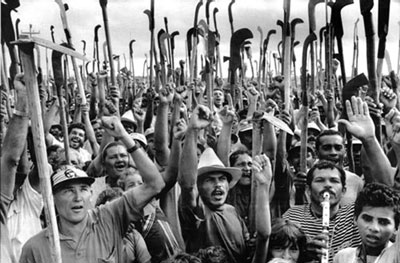Over 30 years of anarchist writing from Ireland listed under hundreds of topics
Democracy in Brazil - Workers Party suppresses anarchists
 As this issue of Workers Solidarity goes to print, Brazil is about to elect a new president. After eight years, the Workers’ Party (PT) incumbent, Lula, must step down. His chosen successor, Dilma Roussef, is poised to become Brazil’s first female president, as she holds a 46.9% to 32.6% lead over her closest rival after the first round of voting. Roussef is a former urban guerrilla who was tortured by the western-backed military dictatorship (1964-1985) before throwing her lot in with electoral politics, joining the PT in 2000.
As this issue of Workers Solidarity goes to print, Brazil is about to elect a new president. After eight years, the Workers’ Party (PT) incumbent, Lula, must step down. His chosen successor, Dilma Roussef, is poised to become Brazil’s first female president, as she holds a 46.9% to 32.6% lead over her closest rival after the first round of voting. Roussef is a former urban guerrilla who was tortured by the western-backed military dictatorship (1964-1985) before throwing her lot in with electoral politics, joining the PT in 2000.
Lula’s term as president is held up by some as one of social and economic progress. Official unemployment has dropped from over 11% to 6.9%, while cumulative per capita GDP growth has been 23% compared to just 3.5% for the preceding term. Also, according to the UN, poverty levels have fallen. Much of this economic growth has been due to China’s appetite for foodstuffs and iron ore boosting Brazil’s exports along with discoveries of offshore oil fields.
However, despite this economic growth, forty million people still live below the poverty line. 1.6% of the landowners still control almost half of the land on which crops can be grown. While inequality still abounds at home, Brazil leads the 9,000-member UN military and police force (MINUSTAH) that has occupied Haiti since June 2004. The role of MINUSTAH is effectively to suppress any attempts by social movements to achieve equality and democracy, while opening the country to further sweatshops, as has been outlined in previous issues of Workers Solidarity. (REFS)
One of the social movements that had helped bring Lula to power was the MST (Landless Peasants Movement). It is the largest in Latin America, with an estimated 1.5 million members organised in 23 out of Brazil’s 26 states. Fighting for the redistribution of land, one of its main tactics is land occupations, a form of struggle that has been harshly repressed by the Workers’ Party government, despite the MST always calling for a vote for the PT.
The murder of Elton Brum da Silva during a police operation to remove landless families from a farm in Rio Grande do Sul was an example of this. This repression quickly spread. The Anarchist Federation of Gaúcha, who work within and alongside the MST, were active in a campaign to bring the police murderers of Elton to justice, accusing the Governor, Yeda Crusius, of brushing the issue under the carpet. For this, their offices were raided in Porto Alegre on October 29th last year, with most of their documents, computer hard disks, posters, etc. being seized. Six anarchist activists were arrested. Due to it being an election year, the trial has been postponed since July. It is due to now take place in December. The WSM calls for solidarity with our anarchist comrades, against the state repression of Lula’s so-called “Workers” Party.

